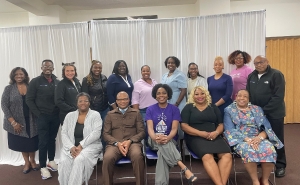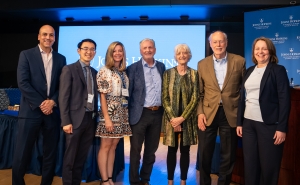Faculty Profile: Kadija Ferryman

“My parents were immigrants, and we were not a wealthy family,” says Kadija Ferryman, PhD, an assistant professor in the Department of Health Policy and Management whose research focuses on bioethics, health technologies, and racial health inequities. “But my mom instilled in us that education is the pathway to success.”
Through a scholarship program, Ferryman and her sister attended an elite Manhattan preparatory school, which offered access to a wide world of educational opportunities and piqued her interest in social science. “We had to travel between boroughs for almost two hours each way to get to school, then navigate the differences in race, class, and culture when we got there. Part of my experiences navigating between different worlds in my formative years influenced my decision to later study anthropology.”
Ferryman went on to get a Bachelor of Arts in Anthropology at Yale, and a Master of Arts and PhD in Anthropology from the New School of Social Research. “I became a policy researcher at the Urban Institute in D.C., and my work on the effects of public housing transformation on education, health, and income really ignited my interest in identifying social influences on health, and how policy could be a tool that could be wielded to make social inequities worse, or intervene to redress past harms, like racial segregation."
Her focus on the social influences of health took a new direction when the human genome was sequenced in the early 2000s. Previously, social scientists and natural scientists were in conflict over the source of health disparities—whether they resulted from differences in genetics or differences in life circumstances and environment. The Human Genome Project demonstrated that genetics alone could not explain health disparities. Ferryman then became interested in new technologies and their impact on health inequities.
Over the years, Ferryman’s research has specifically examined how clinical racial correction/norming, algorithmic risk scoring, and disease prediction in genomics, digital medical records, and artificial intelligence technologies affect racial health inequities. She shares her insights in a class called Race and Bioethics, where students examine the moral and ethical dimensions of health and medicine; review how bioethics has and has not engaged with race; and explore how contemporary bioethics can engage more substantively with race and its implications, specifically on racism and health inequities.
Beyond her impressive research history and expertise, Ferryman brings a unique ability to navigate and bridge cultural divides in her class. “I definitely feel connected with my students coming from underrepresented backgrounds to this elite institution,” she says. “I can understand their tensions in pursuing this line of work and I often see a sense of reservation because so many things are cultural and assumed. I try to make sure we identify some of these assumptions, so all students feel comfortable and can engage substantively in our class discussions. I tell my students that they are the future of bioethics and health policy, and they each have a set of unique backgrounds, experiences, and skills that can contribute to the strength and expansion of our research and practice.”





